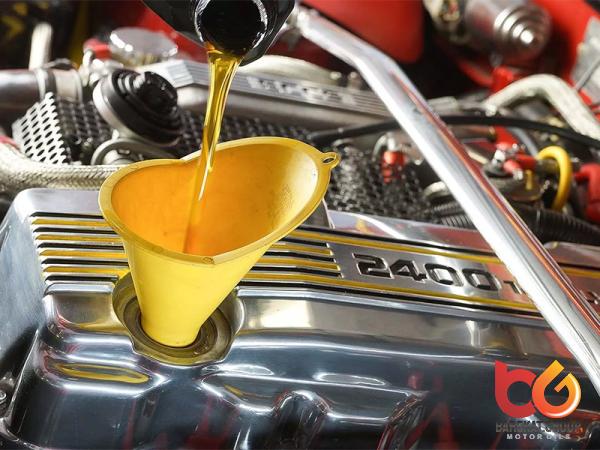Title: A Comprehensive Guide to Buying Conventional Motor Oil: Types and Price Analysis Introduction: Motor oil is a vital component in maintaining the health and longevity of an automobile’s engine. With numerous options available in the market, it can be overwhelming to understand the different types of conventional motor oils and their pricing. This guide aims to provide you with a comprehensive summary of the types of conventional motor oil and an analysis of their prices. I. Types of Conventional Motor Oil: 1. SAE 30: SAE 30 is a single-viscosity oil suitable for use in warmer climates or during summer. It provides excellent lubrication and stability at higher temperatures. This oil is commonly used in older vehicles or lawnmowers. 2. SAE 10W-30: SAE 10W-30 is a multi-viscosity oil that can be used in a wide range of temperatures. The “W” in the designation stands for winter, indicating that this oil has excellent cold-start capabilities.
Engine oil
 This oil type is one of the most commonly used conventional motor oils. 3. SAE 5W-30: SAE 5W-30 is another multi-viscosity oil that offers improved cold-weather starting performance compared to SAE 10W-30. It flows easily at low temperatures while maintaining adequate viscosity at higher temperatures. This oil is compatible with most gasoline-powered vehicles and is widely recommended by manufacturers. 4. SAE 10W-40: SAE 10W-40 is a heavier viscosity oil that offers a thicker film of lubrication, making it suitable for high-mileage engines or older vehicles experiencing oil leakage or burning. It provides better protection against engine wear and reduces oil consumption in older engines. 5. SAE 20W-50: SAE 20W-50 is a high-viscosity oil recommended for older, high-performance engines or those that operate in extreme temperatures.
This oil type is one of the most commonly used conventional motor oils. 3. SAE 5W-30: SAE 5W-30 is another multi-viscosity oil that offers improved cold-weather starting performance compared to SAE 10W-30. It flows easily at low temperatures while maintaining adequate viscosity at higher temperatures. This oil is compatible with most gasoline-powered vehicles and is widely recommended by manufacturers. 4. SAE 10W-40: SAE 10W-40 is a heavier viscosity oil that offers a thicker film of lubrication, making it suitable for high-mileage engines or older vehicles experiencing oil leakage or burning. It provides better protection against engine wear and reduces oil consumption in older engines. 5. SAE 20W-50: SAE 20W-50 is a high-viscosity oil recommended for older, high-performance engines or those that operate in extreme temperatures.
Specifications of Engine oil
 It offers better stability at higher temperatures and provides protection against engine wear and deposits. II. Factors Affecting Conventional Motor Oil Prices: 1. Brand Reputation: Established and reputable brands often charge a premium for their motor oils due to the quality and performance associated with their products. 2. Base Oil Quality: The quality of the base oil used in the formulation significantly affects the price of conventional motor oil. The higher the quality, the higher the price. 3. Additive Package: Different motor oils contain various additives to enhance their performance. High-quality additive packages will often result in higher prices. 4. Certification Standards: Motor oils that meet or exceed industry standards such as the American Petroleum Institute (API) certification tend to be more expensive due to the rigorous testing and quality control involved.
It offers better stability at higher temperatures and provides protection against engine wear and deposits. II. Factors Affecting Conventional Motor Oil Prices: 1. Brand Reputation: Established and reputable brands often charge a premium for their motor oils due to the quality and performance associated with their products. 2. Base Oil Quality: The quality of the base oil used in the formulation significantly affects the price of conventional motor oil. The higher the quality, the higher the price. 3. Additive Package: Different motor oils contain various additives to enhance their performance. High-quality additive packages will often result in higher prices. 4. Certification Standards: Motor oils that meet or exceed industry standards such as the American Petroleum Institute (API) certification tend to be more expensive due to the rigorous testing and quality control involved.
Buy Engine oil
 5. Packaging and Size: The size and packaging of the motor oil can influence its price. Larger containers or well-designed packaging may cost more. III. Price Analysis of Conventional Motor Oil: 1. Entry-Level Brands: a. Super Tech Conventional Motor Oil: Available in various viscosities, Super Tech is Walmart’s own brand, providing affordable options for everyday drivers. b. AmazonBasics Conventional Motor Oil: Amazon’s brand offers competitively priced conventional motor oil that meets API certification standards. 2. Mid-Range Brands: a. Valvoline Conventional Motor Oil: A well-known brand offering a wide range of conventional motor oils designed for different engine needs.
5. Packaging and Size: The size and packaging of the motor oil can influence its price. Larger containers or well-designed packaging may cost more. III. Price Analysis of Conventional Motor Oil: 1. Entry-Level Brands: a. Super Tech Conventional Motor Oil: Available in various viscosities, Super Tech is Walmart’s own brand, providing affordable options for everyday drivers. b. AmazonBasics Conventional Motor Oil: Amazon’s brand offers competitively priced conventional motor oil that meets API certification standards. 2. Mid-Range Brands: a. Valvoline Conventional Motor Oil: A well-known brand offering a wide range of conventional motor oils designed for different engine needs.
Engine oil + buy and sell
 b. Pennzoil Conventional Motor Oil: Renowned for their high-quality oils, Pennzoil offers conventional motor oils for both gasoline and diesel engines. 3. Premium Brands: a. Mobil 1 Conventional Motor Oil: Mobil 1 offers conventional motor oils with advanced additive packages, providing enhanced protection and performance. b. Castrol EDGE Conventional Motor Oil: Known for their commitment to innovation, Castrol EDGE produces high-performance conventional motor oils suitable for demanding applications. Conclusion: When purchasing conventional motor oil, it is essential to consider the specific type that suits your vehicle’s requirements and the prevailing weather conditions in your area. Prices can vary based on brand reputation, base oil quality, additive packages, certification standards, and packaging. By understanding the different types of conventional motor oil and their price variations, you can make an informed decision that balances both cost and performance. Always refer to your vehicle manufacturer’s recommendations when selecting the appropriate motor oil for optimal engine health.
b. Pennzoil Conventional Motor Oil: Renowned for their high-quality oils, Pennzoil offers conventional motor oils for both gasoline and diesel engines. 3. Premium Brands: a. Mobil 1 Conventional Motor Oil: Mobil 1 offers conventional motor oils with advanced additive packages, providing enhanced protection and performance. b. Castrol EDGE Conventional Motor Oil: Known for their commitment to innovation, Castrol EDGE produces high-performance conventional motor oils suitable for demanding applications. Conclusion: When purchasing conventional motor oil, it is essential to consider the specific type that suits your vehicle’s requirements and the prevailing weather conditions in your area. Prices can vary based on brand reputation, base oil quality, additive packages, certification standards, and packaging. By understanding the different types of conventional motor oil and their price variations, you can make an informed decision that balances both cost and performance. Always refer to your vehicle manufacturer’s recommendations when selecting the appropriate motor oil for optimal engine health.
Your comment submitted.